Anne Snyder: Welcome back to The Whole Person Revolution, a podcast of Breaking Ground. Today I’m honored to get to introduce you to Dwan Dandridge and Chris Lambert, two guys from Detroit, Michigan, who together work daily toward breaking down barriers and building bridges in a city riven by decades of racially charged neglect, government control and whiplash, and layers of earned mistrust—between black folks and white folks, between black residents and the state and federal powers that be, between neighborhoods, between urban dwellers and suburban dwellers, between newcoming do-gooders and longtime residents who’ve earned a right to deep skepticism, one betrayal and repeated tear at their hope and love of place at a time.
Life Remodeled is the organization that Chris founded back in 2011, and it tries to carve out some fresh turf in this fraught minefield. Every year Life Remodeled identifies a key community asset in a given neighborhood and remodels it, repairs owner-occupied homes throughout that chosen neighborhood, and mobilizes at least ten thousand volunteers in an annual cleanup project that spans six days and three hundred city blocks. The primary goal is not to salvage Detroit, nice by-product though that would be, but rather to create opportunities for the transformation of people—both those served and those who are serving.
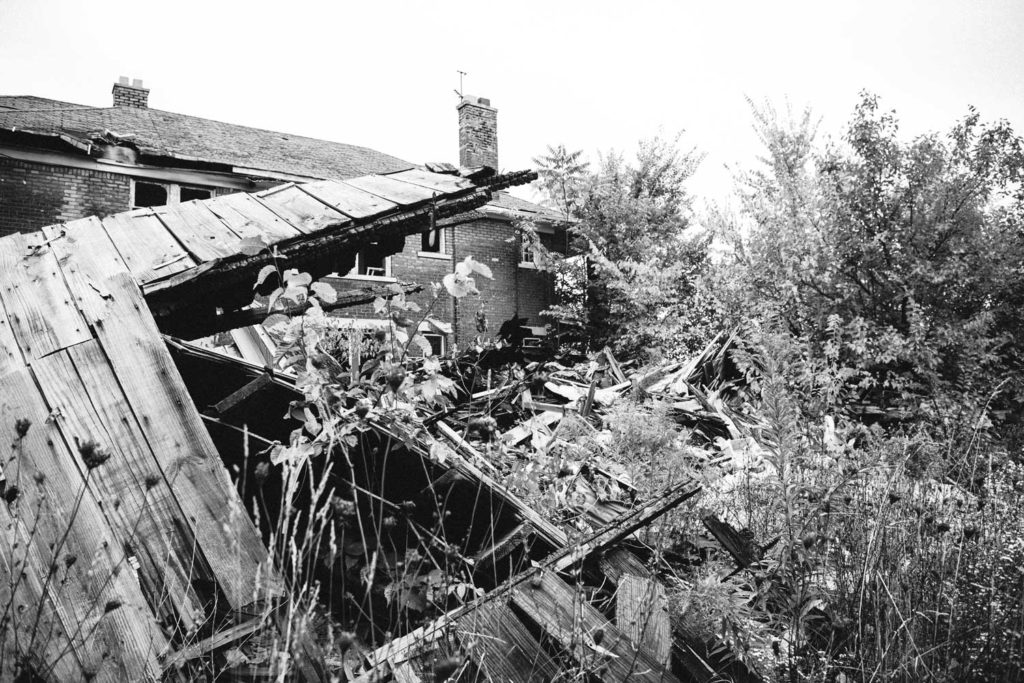
Part of Life Remodeled’s mission is to mobilize volunteers to clean up residential blocks that have an advanced level of decay. Photograph by Stephen Smith, courtesy of Bittersweet Monthly.
There are some beautiful stories, and some really messy ones. We’re getting together today to talk about both. Chris and Dwan, it’s really great to see you both today.
Chris Lambert: Great to be with you, Anne.
Dwan Dandridge: Anne, thank you so much for having us. It’s always a pleasure when we can connect.
Anne: My pleasure. So I invited both of you on the show in part because I find your friendship and working relationship both striking and instructive. I’m sure that it’s probably had its fair share of tensions and bruises and learning curves, and maybe even some battles over the years, but there seems to be a perseverance about it and a very deep and mutual honoring of one another. Could you tell us a bit about how you two met and what’s nourished and sustained your relationship to date?
Chris: I think we met through a mutual friend and it was just kind of an acquaintance thing. We said hi to each other, but then there was a time in our organization’s history when we were looking at possibly doing some work around mentorship that involved engaging a contractor. Dwan knew that world.
That program actually never ended up taking off, but then there was another opportunity where we needed a project manager for this six-day project back in 2016. I reached back out to Dwan. We ended up sitting down for lunch. We were having a great conversation before he said something that really intrigued me.
I asked him, “What is it about Life Remodeled that interests you in possibly joining our team?” And the first thing that he said was, “I’m actually excited about what I can bring to the table to help point out some blind spots in the organization.”
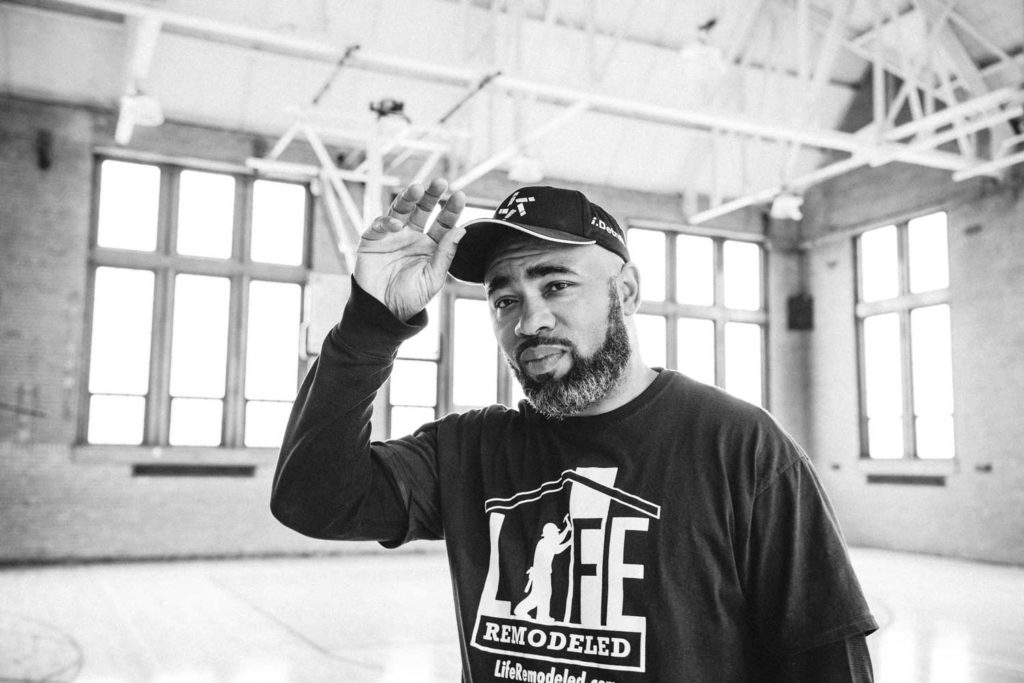
Dwan Dandridge. Photograph by Stephen Smith, courtesy of Bittersweet Monthly.
Well, I didn’t think we really had many blind spots. I’m thinking to myself, who is this guy? We’ve only talked a couple of times and he’s already telling me in a job interview about blind spots. And then I’m thinking to myself, well, now I want to know exactly what they are, right now. So that’s how we got started.
Dwan: Yeah. I’m huge on power dynamics. So as Chris, in his mind, was interviewing me, I was actually interviewing him.
The first time we met, he had reached out looking for someone to come and help with some mentoring programming as it intersected with Life Remodeled’s construction component. And I remember my business partner at the time—Steve Kato, a White man—and I were sitting in that room with Chris. At a certain point while we were having this discussion about how to make this work, I paused and said, “We’re talking about doing a program that is geared toward mentoring black men in Detroit, ages eighteen to twenty-four. I’m the only black man in the room. And if Steve didn’t invite me here, I wouldn’t be in the room. Am I the only person who sees a problem with that?”
I think that for many Detroiters who work to love and care for Detroit, and I’m talking about black Detroiters now, we saw the momentum that Life Remodeled had, and we saw the impact that it would have on the community. Chris is a get-stuff-done type of person. So am I.
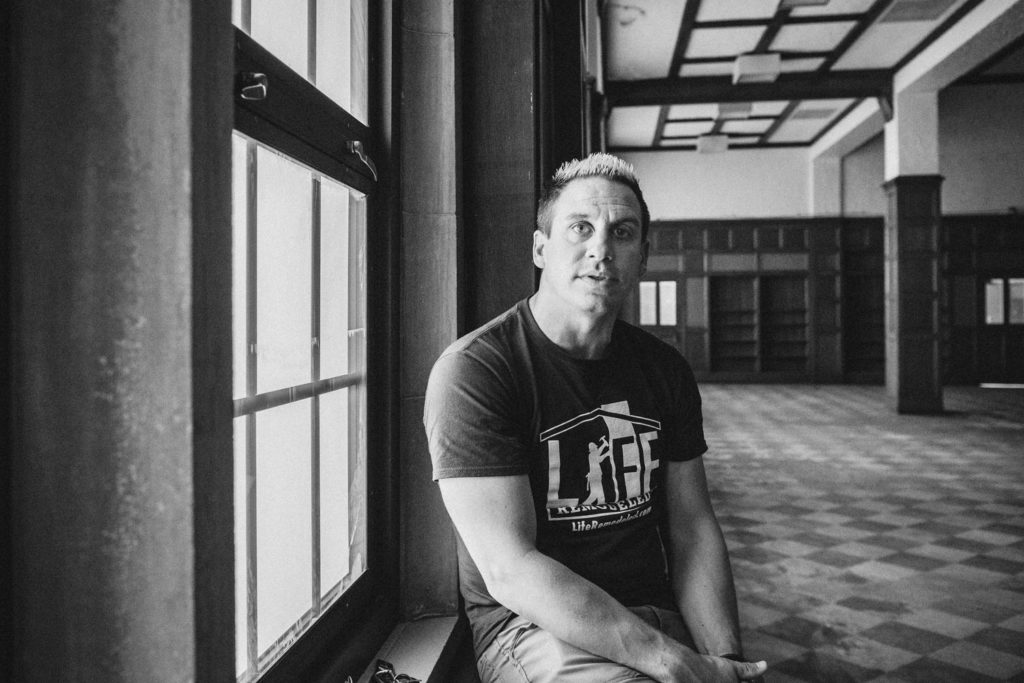
Chris Lambert. Photograph by Stephen Smith, courtesy of Bittersweet Monthly.
And often, when you’re a get-stuff-done type of person, you move really quickly and you have to make decisions and you have to be able to improvise and move. Nobody felt like they knew who he was or could get a feel for who he was. I still get that question sometimes today. I still remember watching Chris at a function we were at together. It always seemed like he was in a meeting that had to get something done, where he was either making an ask, or someone was making an ask of him. I was like, man, that just looks unhealthy if all of his relationships are like that.
I just asked him, “Do you have any relationships or friendships that aren’t transactional, where you aren’t trying to accomplish something?” He and I weren’t really even thinking or talking about working together at this time. My heart just went out to him, because his whole MO just seemed like a lonely way to live.
I just asked him, “Do you have any relationships or friendships that aren’t transactional, where you aren’t trying to accomplish something?”
At the interview he’s talking about, I definitely went in knowing that Life Remodeled had some blind spots. They were just that; it’s not a surprise to me that he wasn’t aware that they were there. That’s why they’re blind spots. And I spoke up because I didn’t want to see Life Remodeled fail, just because of something that it may not have understood about Detroit, about the people you work alongside of and partner with.
But reflecting now on the relationship as it’s developed, for me, it really started to turn into a friendship when I saw Chris’s resilience, and I saw a humility in him. Often, humility doesn’t come along with somebody who’s that focused, who can get a lot of stuff done. . . . I think part of the humility you now see in Chris he actually owes to the community that we work in, because they were not going to take anything less.
But seeing him be able to hit some challenges that he didn’t prepare for and still be willing to come to the table and continue to pursue the mission in a way where the community felt respected, I started to grow a deeper level of love for him as a person. He became not just somebody that I worked with, but a friend.
Often, humility doesn’t come along with somebody who’s that focused, who can get a lot of stuff done.
Anne: That’s a real grace. We’ll get into that in a bit, some of the cross-cultural dynamics and the tensions between getting stuff done and [the more inconvenient] relational pieces, but just stepping back a bit, what fundamentally is the work of Life Remodeled, and how do you go about fulfilling the mission of it?
Chris: At the heart of our mission is a desire to bridge people across divides and to help transform each other’s lives. Because we all recognize right now how polarized our country is . . . I’ve found that if you try to get two people who are polar opposites on issues of race, religion, or politics to sit down at a table, look each other in the eye, have a conversation, and work it out, nine times out of ten that’s not a very productive conversation.
But we found that if you can invite the same two people to work shoulder to shoulder on an action-oriented project, something magical happens, where they begin to develop foundations of respect for one another. Foundations that are transformational for everyone who’s involved.
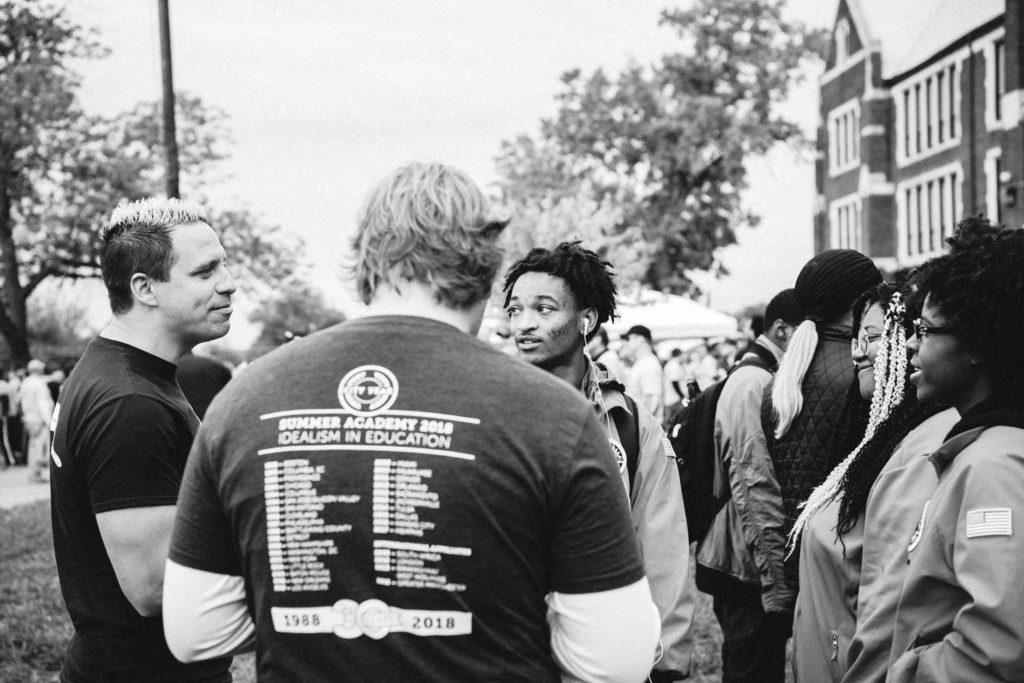
Chris Lambert greets high school volunteers who are helping clean up residential blocks affected by overgrown vegetation and decay. Photograph by Stephen Smith, courtesy of Bittersweet Monthly.
The narrative of philanthropy is often that the benefactors are the heroes and have all the goods, and that the beneficiaries just need to receive and maybe move up a couple notches. And what we’re saying is, no, we all have a lot to offer, and we all have a lot to learn.
I’ve found that if you try to get two people who are polar opposites on issues of race, religion, or politics to sit down at a table, look each other in the eye, have a conversation, and work it out, nine times out of ten that’s not a very productive conversation. But we found that if you can invite the same two people to work shoulder to shoulder on an action-oriented project, something magical happens.
Anne: This has been a disruptive year for those organizations who work on the ground that don’t have the luxury of sitting behind a computer screen. How has Life Remodeled’s work been affected, first, by COVID-19 and then the racial wake-up alarm that’s hit the country?
Chris: So COVID-19 was big, obviously, for all nonprofits and still has the potential to have a massive impact. Immediately we started preparing for what could potentially become a greater depression than the Great Depression.
We began to reimagine our organization’s programs, our positions, and even our people in those positions. And it was actually a very fruitful exercise that I think made us a stronger organization; we began to try to predict what the new normal would look like, while holding those predictions fluidly. But we also realized that we needed to make some pretty significant financial decisions, because giving is going to be a lot lower than what it would be.
And then what happened to George Floyd, his murder, began to change some of that positioning that we ran into as an organization, because our work became more relevant. Dwan, I’d love to hear your perspective
Dwan: There are some real sensitive ears in Detroit right now. Many are wondering about the authenticity of some of the organizations that seem to be paying more attention to issues of race. I’m very proud that when I get questions from people who may be suspicious along these lines, I get to say that this is not something new for us at Life Remodeled. This is not something where we are suddenly responding to what happened with Ahmaud Arbery and then George Floyd.
We’ve long identified race as an issue, especially as it affects the relationships between the suburban community, business community, and the inner city. And before this year’s events even started rolling we’d begun talking about having some race programming at Life Remodeled.
For instance, at this year’s Super Bowl, we hosted a big party where 160 people showed up. And we had a discussion before the game about Kaepernick and peacefully protesting during the anthem. We had people from very, very different perspectives there to sit on a panel, and it went really well. We had a good turnout. Everybody’s voice was respected. And we started to realize that we really have something to offer in this space as an organization. Chris and I get calls like this often, people wanting to know. I think really what they’re not saying, but what they want to know is like, “How the heck did you pull this off? We saw where you were in 2017.” How did you get to this space where somebody is posting a picture with Chris on their social media thread who back in 2017 was sitting in opposition to Life Remodeled? Having them share a meal or drink or having them over to his house . . . real genuine relationships [had formed after a long, messy road].
So, when I’ve gotten questions about “Is this really real?” it’s an easy answer for me. This is not something that we’re just responding to. But I think that we have a pretty unique voice to speak to some of the people who are waking up, and we’re able to say things that they wouldn’t say before because of the social pressure. “We want to support black organizations.” Or: “Can you connect us with black organizations?” And we have already positioned ourselves to be a conduit to help facilitate some of those discussions and some of those relationships.
There are some real sensitive ears in Detroit right now. Many are wondering about the authenticity of some of the organizations that seem to be paying more attention to issues of race.
Anne: Yeah. On that subject, Dwan, to be a bit personally transparent: I think we’re all on different journeys in our contexts. And in my own, which is the magazine world, I pitched a vision for Comment magazine last October 2019, sincerely and out of the fruit of some of my own life experience. And the basic message was, “We need to widen the table of voices speaking into the various pains of our common life, to actually represent the household of faith as it exists. The table needs to be so much wider.” And I used that metaphor of “the table,” which I’ve since learned is a frustrating metaphor for many people of color, but at the time all I conceived was the hospitality embedded in the image. And I was saying sentences like, “There needs to be an alliance” [between the historic gatekeepers of theological conversation in the US and all those who are equal members of the household of Christian faith].
. . . So here I was using words like “alliance” and “bridge-building,” and I still believe in those tasks, but I’ve come to understand how naïve I was, how I hadn’t thought through the underlying issues of long-standing distrust when those kinds of overtures are made from someone who looks like me. I received some pushback of, “Well, how are you going to atone for ways in which these kinds of invitations to come to the table have been dishonored?” So, that’s in the publishing and magazine context, but I think those kinds of dynamics are happening in lots of different places and sectors.
And I’m curious: As an organization that is built on this premise of breaking down barriers and bridge-building, how would both of you reflect on lessons learned? For example, it’s not always just about bringing people together to encounter difference that they wouldn’t otherwise; sometimes there are some real apologies that need to be made. How do you demonstrate that with your life? And institutionally, how do you scaffold that sort of moral process?
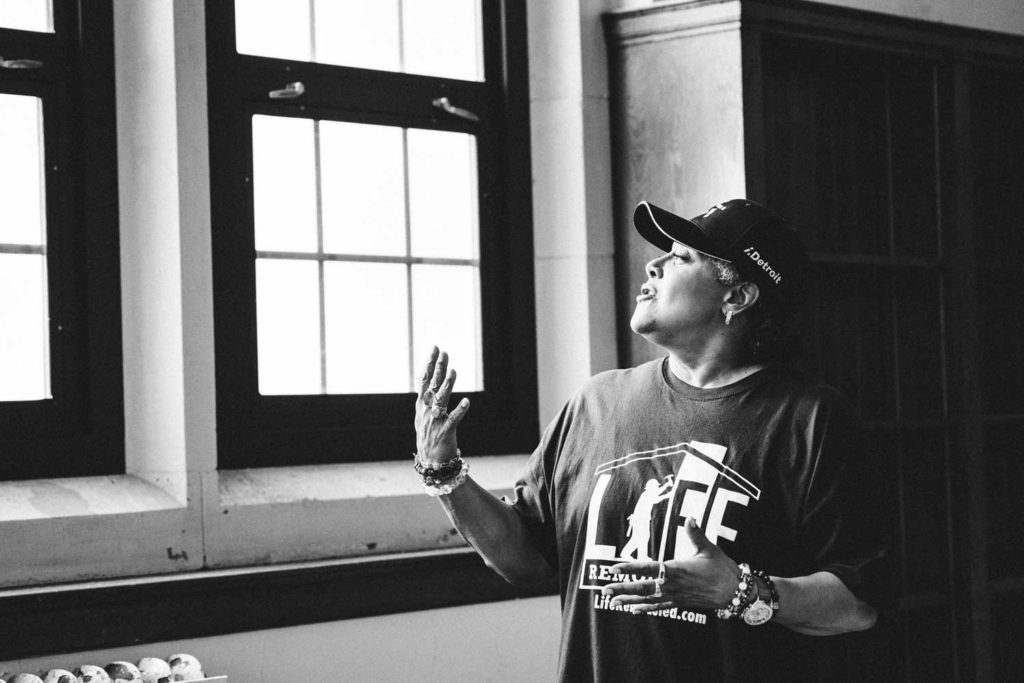
Denise Lyles, a community leader in Detroit. Photograph by Stephen Smith, courtesy of Bittersweet Monthly.
Dwan: Well one of the things I said to Chris early on in our experience is that you’re entering into a relationship with people who have been in very abusive relationships in the past. And when you’re dealing with people who have been in abusive relationships, there’s all kinds of baggage that they bring to the table from those relationships. And I said to Chris, “There will be times when you’ll be accused of something.” I think I also told him, “You have a five- or six-year history of doing some amazing things in the city of Detroit. You’re up against the four-hundred-year history of people who look like you doing some very damnable things to people who live in Detroit.”
When you’re [entering into a relationship] with people who have been in abusive relationships, there’s all kinds of baggage that they bring to the table from those relationships.
Chris: Dwan, I just want to highlight something you said about the abusive relationships, because I think some listeners may take that in the sense that we normally think of abusive relationships—between just a spouse or a boyfriend and girlfriend—but maybe if you want to provide a little more context to the broader view that you hold about the nature of the abusive relationships.
Dwan: Yeah. That is the example that probably comes to mind immediately. But when you are talking about relationships, we have a wide range. And to give historical context—Anne was speaking of coming to the table and whatnot, and things of that nature have been tried before—but you have things like the , and similar things have happened in Philadelphia.
If you hear me say those things and you’re listening and you’re not aware of what they are, just look at the 1921 Tulsa, Oklahoma, massacre, where there were thriving communities of black folk that were taken advantage of, and they actually got slaughtered by the surrounding community of White people. And the thing that doesn’t get told when we simply tell the story like that is that many of the people who participated in the looting, the crime, and whatnot were God-fearing, churchgoing believers.
What you need to understand is that we have learned that not trusting could be the very thing that saves your life. So, that’s kind of the lens and the context through which we view those types of offers oftentimes.
So someone like Chris coming, saying that they’re going to do an amazing project in your community . . . I was trying to get Chris to understand that this is who you’re talking to. And this is who you’re looking to partner with. I said to him, if you are accused of being something that you’re not, of something you haven’t done, you have to be able to say, “Look, I’m sorry, but that’s not me. That’s not what I’m about. That’s not what I did.”
We have learned that not trusting could be the very thing that saves your life.
And when you do something that reminds people of or resembles those abusive relationships, you’ve got to own that. You have to figure out what repentance looks like. There was a long process where Chris had to continue to apologize to the community, but not just apologize: show that he was willing to move differently.
There were people who were tired of hearing him apologize. It was like, “You need to stop apologizing.” They thought that they were giving him really sound advice—and this was Black people and White people telling him that. I was like, “No.”
There was a long process where Chris had to continue to apologize to the community, but not just apologize: show that he was willing to move differently.
In the faith [world], when we talk about race, we have a really unhealthy balance to the way that we apply biblical teaching. We want to talk about the forgiveness part. And we have not as a nation repented. So if we’re not talking repentance, it winds up being the faithful asking those who have been on the losing side of the sin to do all of the heavy lifting. And I don’t think that that’s a complete, accurate, or even a healthy biblical approach, for anybody on either side.
In the faith [world], when we talk about race, we have a really unhealthy balance to the way that we apply biblical teaching. We want to talk about the forgiveness part. And we have not as a nation repented.
Anne: Yeah.
Chris: I want to jump in and say, one of the things that really attracted me to Dwan when I first met him was our shared worldview, and that comes from a place of faith at the deepest level for both of us. Just like Dwan described me, I’m a roll-up-my-sleeves kind of guy. Let’s get it done. That’s who Dwan is. For me, as someone who lived in the suburbs and wanted to move into the city, I was attracted to finding people who I thought were similar, but yet very different in terms of their experience on race and other life experiences. That’s one of the things that initially drew me to ask Dwan to join our team.
But when I asked Dwan to join our team, I was really thinking of Dwan from the perspective of what he brought to the table in terms of the job description that would help the table. And reforming Life Remodeled’s perspective of race and my perspective of race wasn’t in the job description.
At that time when we met, I would have said—and I probably did say to Dwan—that I believed that people in the neighborhoods we’d worked in had just as much to offer me and the White donors and the White volunteers from the suburbs. I believed that in my head, but I’m going to be honest with you: As I look back now, I don’t think I believed it very much in my heart. What has happened since 2017 has radically changed that idea for me and become something I actually believe in my heart. I can now give experience and testimony to how much my life needed remodeling. And a lot of that remodeling requires demolition of false beliefs, false expectations, and wrong perspectives. Dwan has helped me more than any person I know to really have a greater understanding of how black and white America can love one another. And Dwan didn’t just do that himself. Dwan served as a bridge-builder between many other people who I needed to learn from and love and learn to love.
I can now give experience and testimony to how much my life needed remodeling. And a lot of that remodeling requires demolition of false beliefs, false expectations, and wrong perspectives. Dwan has helped me more than any person I know to really have a greater understanding of how Black and White America can love one another.
Anne: Thank you both. Could you provide a little more context as to what you mean in terms of this shift? Particularly for you, Chris, and your own leadership of Life Remodeled and your own personal demolition?
Chris: Prior to 2017, we were renovating existing school buildings. At the end of 2016, the school district said, “We want to give you a school building that’s currently a school, because we’re going to move all the kids from this building into the next building, and we want you to repurpose it.” We thought, “Okay, great. Let’s do it.”
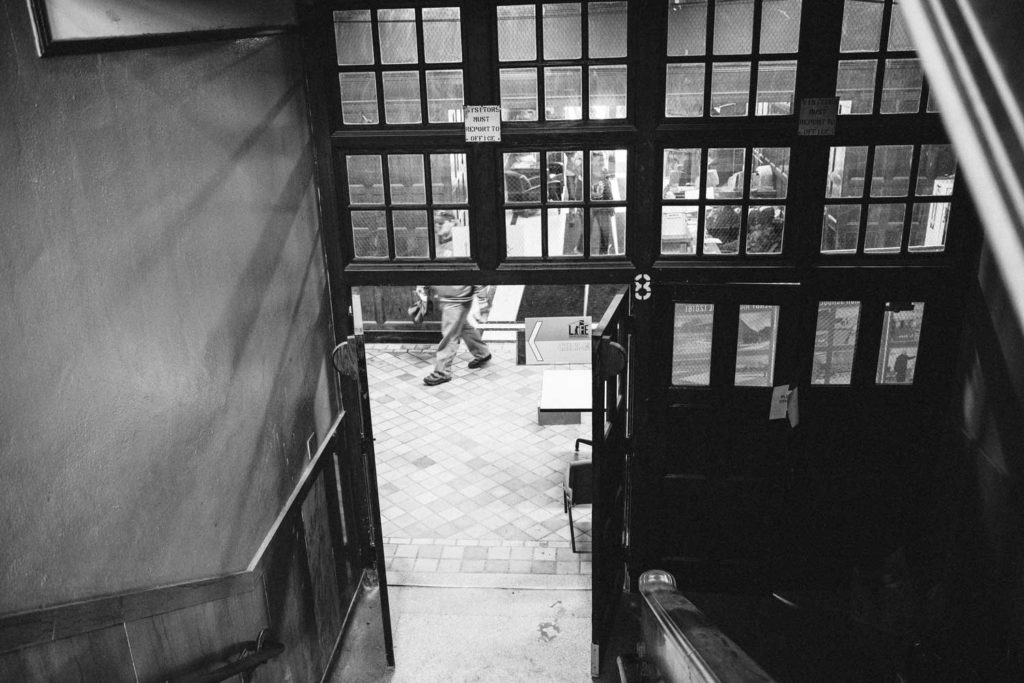
The school building that Life Remodeled was given. Photograph by Stephen Smith, courtesy of Bittersweet Monthly.
We shared the vision with the community. The community seemed to be favorable toward it, but what we weren’t allowed to tell the community was that we were acquiring the building, and acquiring it for one dollar a year for fifty years. I actually thought that people were going to be excited about that because we were getting such a great deal, which meant we could use so much more of the philanthropic money to invest in the kids and the community.
This all happened right before Dwan joined our team. Dwan joined our team, and I told him what we’d done and how now we were going to share it with the community. I think he was thinking to himself, wow, I wish I would have known that before I said yes to the job. Dwan predicted everything that would unfold. So I think maybe it’d be best for Dwan to summarize.
Dwan: I still remember that moment. I still remember that moment when I found out that the community had not been informed. And I just explained to Chris, “No. That’s a no-no.” In that situation, if you’re asked not to communicate to the team, to the community that you’re looking to partner with, that’s got to be deal-breaker. I said, “You have to represent them at the table. And that’s not fair, because nobody elected you to represent them, but you have to speak for them and say, ‘I can’t take this deal unless I’m able to communicate it with them beforehand.’”
That speaks to the trust component, earning trust, that we’re going to get into later in the conversation, but that’s what we’re talking about when you hear us talk about 2017.
Chris: People reacted, saying, “I lost my house, and here comes this guy.” The organization is led by many people, but I was associated with it as a white guy, so it’s clearly a white organization. “This white guy gets a building for a dollar a year. What other real estate is going to be given to him? He’s going to gentrify the area. He’s going to displace us.” I was called a white mother-effer from the stage, and Dwan was called worse. And here we were.
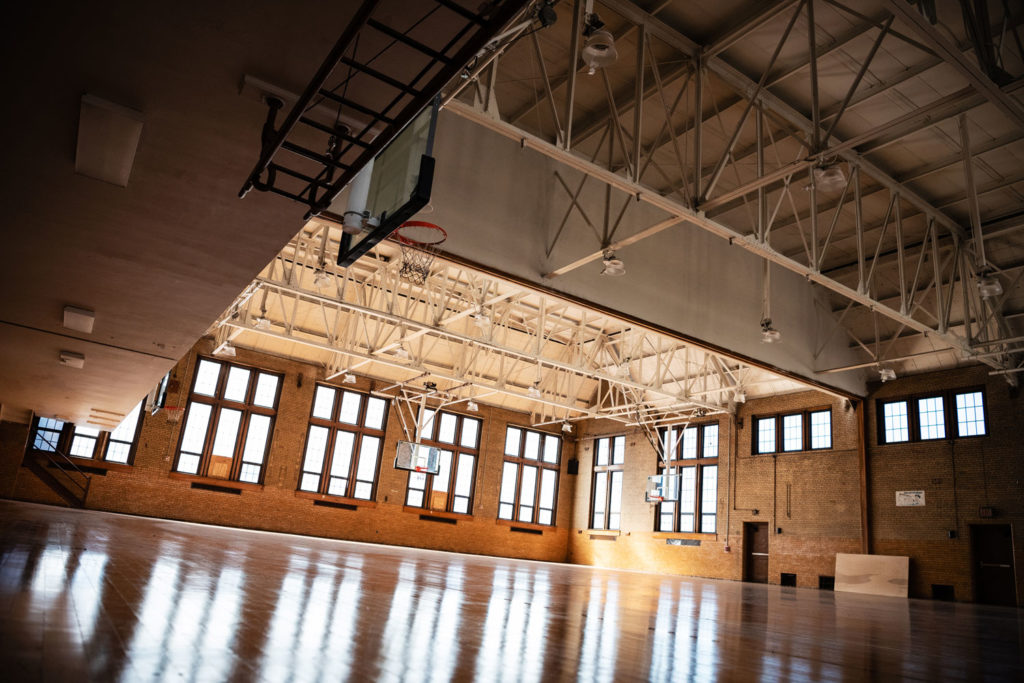
New lacquered floors in the school building. Photograph by Stephen Smith, courtesy of Bittersweet Monthly.
Anne: The real deal.
Dwan, earlier you were talking about what people of faith in the American Christian context often miss about notions of reconciliation and forgiveness—the missing emphasis on all the focus on forgiveness being repentance. And when I hear you say that, I do think we’re probably entering a period where both “the church,” as well as the country at large, are going to be entering a series of much more mainstream discussions around reparations.
I do think we’re probably entering a period where both “the church,” as well as the country at large, are going to be entering a series of much more mainstream discussions around reparations.
There are a million ways we could get at that, and we’re not going to tackle it in this hour, but you guys no doubt have thought about this seriously. As you think about Life Remodeled and where you all are at now in your work and in your relationships in the city of Detroit, is it doing a form of reparations, or is that still ahead?
Dwan: That’s still ahead. I think there’s potential there. And I think there are moments when we do something that feels like reparations. We may call it something a little bit different. At the end of the day, if we have to call it something different and it still ends up being reparations, I’m still for that, personally.
But I do believe that there’s potential as an organization to lean in and even lead by example with some creative ways to actually do reparations.
If we talk about some of the things we’ve done during the pandemic and show the difference between Life Remodeled before and after 2017—the lessons the organization has learned from the community that we’ve worked in and partnered with—there were some people who wanted to provide some resources to Life Remodeled to actually get meals for the community. Chris and I met with the Life Remodeled community advisory council, a list of community leaders who advise us on some different ways that they think resources can be best used. When people started to cut checks to provide meals, one of the things we would do was spend this money to buy gift certificates for some of the black-owned restaurants in the city of Detroit that were really suffering and struggling during the pandemic.
The Life Remodeled community advisory council members came together with us to actually pass out those meals and pass out the gift certificates for people to go and use them at those restaurants. So those are some ways, and we’re still constantly trying to figure out other ways.
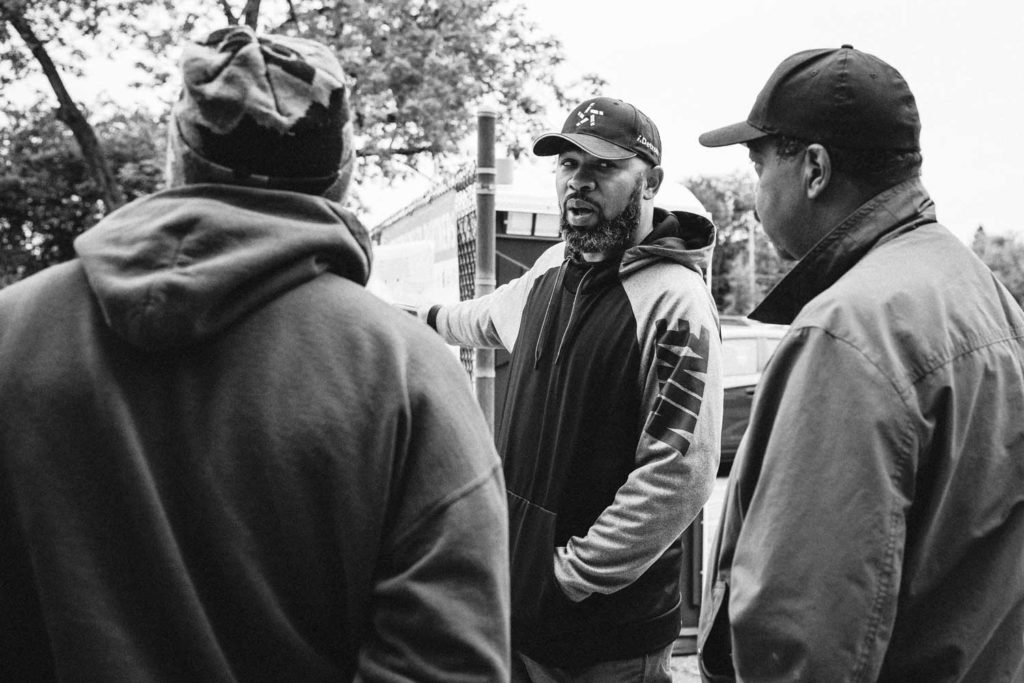
Dwan Dandridge walks volunteers through traffic assignments during a volunteer clean-up project. Photograph by Stephen Smith, courtesy of Bittersweet Monthly.
The way I view it is that the community understands and is really aware of many of its own needs, but they don’t necessarily have the dollars. But understanding is a resource in itself. Like Chris was saying when he talked about the philanthropic community, the way we view those resources is out of balance. The philanthropic community understands that the dollars are needed. But those dollars by themselves are of no good without the understanding that the community has. So if we can figure out a way to continue to be a conduit and bring them together, that’s a form of reparations—but I think there has to be a lot more, because there’s definitely a significant debt owed, when you talk about reparations.
The way I view it is that the community understands and is really aware of many of its own needs, but they don’t necessarily have the dollars. But understanding is a resource in itself.
Chris: Prior to moving to Detroit, I’d traveled in or lived on every continent in the world, except for Antarctica, including living in Africa for nine months. I was a missionary there, and I thought I really understood contextualization. I thought Life Remodeled was doing such a great job around race. At that time in my life, and even in 2016, I definitely didn’t believe in reparations. I’d only heard it talked about a few times, and it was just a concept to me. I immediately thought of the political implications. I was like, “No, it’ll never work.” And I only thought about reparations in the context of handing out cash.
When Dwan joined our team, I asked him if he wanted to come with me into a few different circles of all white men who were all Republican. I said, “How do you feel about working with some guys who probably—a lot of them—are going to have very, very racist views, spoken or unspoken?” He was like, “Well, I believe in reparations. So I’m all good with it.”
When he said that, a part of me was like, I don’t know about that. Reparations. But over time, my perspective has changed dramatically to where I do believe in reparations. I don’t know what it should look like. I don’t think it should be handing out cash, but I do believe in it.
The philanthropic community understands that the dollars are needed. But those dollars by themselves are of no good without the understanding that the community has.
Anne: Thank you both. Earlier, Dwan, you talked about this issue of earned trust, and also earned mistrust. You all have learned a lot about the uphill battle that is subverting the patterns of history. How do you re-earn trust in communities that have never been served well by trusting? What would you say are the key ingredients in earning trust in a given community? Especially when part of Life Remodeled’s chosen approach is not to stay in a community forever but to serve as an outside catalyst. When we think about trust, we think about the long term, about consistency, et cetera. How have you figured this out?
How do you re-earn trust in communities that have never been served well by trusting? What would you say are the key ingredients in earning trust in a given community?
Dwan: My personal take on trust is that I don’t believe in asking for it. I just don’t think it’s necessary. Stepping into and embracing the lack of trust is a great space to find yourself in.
One of the things I said early on in Life Remodeled was, we shouldn’t ask anybody to blindly give us trust at all. If we are who we say we are, we’re going to do what we say we’re going to do. I believe in inviting people to watch me or watch us as an organization. If we step away from the vision and the mission that we said we were on, we need somebody watching us to call us out. That, I think, is a more healthy approach.
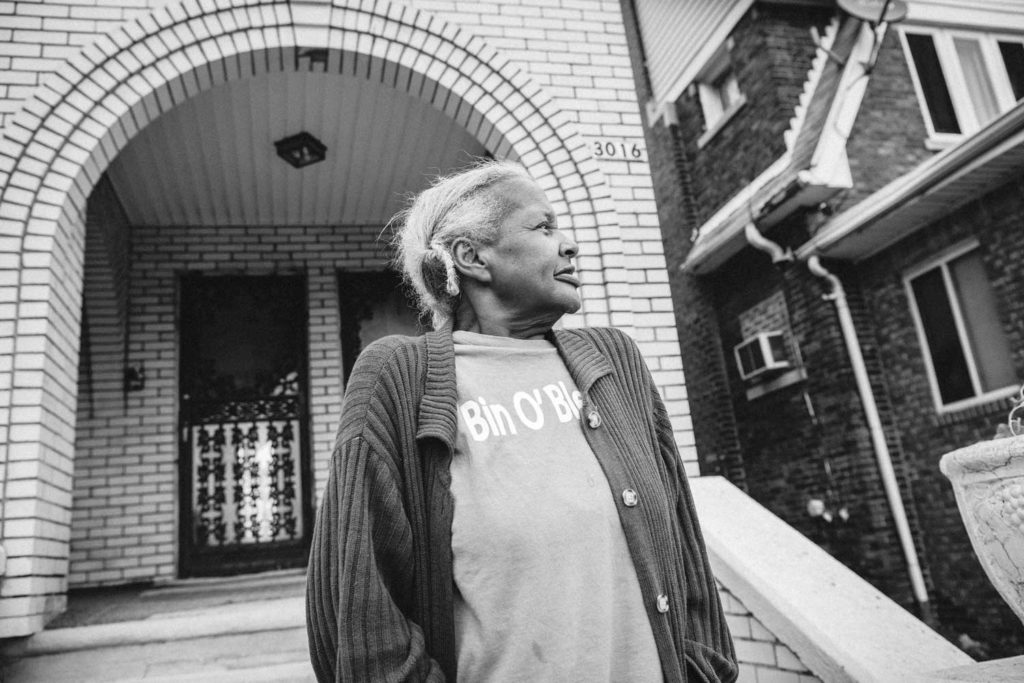
Long-time resident Mrs. Alvis Brown. Photograph by Stephen Smith, courtesy of Bittersweet Monthly.
The lack of trust is this really sweet spot for organizations working in spaces like the communities that we work in. Because if you’re constantly looking to earn trust, that’s a level of accountability that will keep you honest when you feel the need to deviate or an opportunity to deviate from who you said you are.
My personal take on trust is that I don’t believe in asking for it. I just don’t think it’s necessary. Stepping into and embracing the lack of trust is a great space to find yourself in.
Anne: Thanks. Chris, do you have anything to add?
Chris: Amen.
Anne: Most of us inhabit multiple worlds. You’ve got your family; if you’re a churchgoer you’ve got that; you’ve got your neighborhood; you’ve got other communities you’re a part of. And then you’ve got this work together, which spreads into so many different parts of Detroit. And I’m sure there’s a lot of overlap also with the lives you lead and where you live them.
But one of you is black, and one of you is white. How do you navigate the many different worlds you each inhabit, especially in this national moment when there is more of a racial emphasis and a lot of conversations and questions about what is owed and inequality and all those things?
As you walk in overlapping and different spaces—like Chris, for instance, part of the Praxis community—and different networks of different levels of perceived influence and assumptions, do you find yourself doing a lot of code-switching? And if so, who, ultimately, are you seeking always to honor? Or what are you always trying to honor and protect as you’re navigating different kinds of people?
Chris: I would use the word “contextualizing.” I do a lot of that. And I do have a priority for who I want my life to be about and what hill I want to die on. That became really, really, really clear for me when I became a Jesus follower at the age of twenty-two. And eventually my wife and I ended up moving to Africa together and doing a lot of work with people living in very impoverished situations. Reading about the life of Jesus in that context, it became extremely apparent to me that he spent the majority of his life with the people who are most marginalized in society.
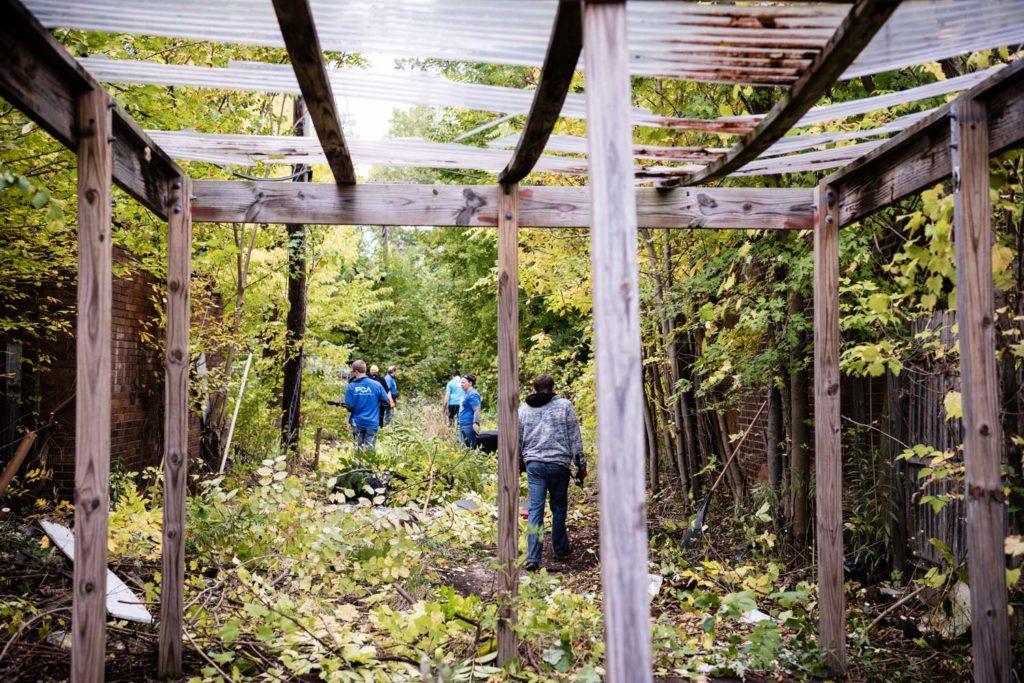
Nature reclaims dormant alleyways, and coyotes have taken up residence. Photograph by Stephen Smith, courtesy of Bittersweet Monthly.
I believe that our lives as Jesus followers really ought to look like his. So I decided at that young age that that was what my life was going to be about. And as more and more time goes by, that begins to be my priority.
Now, that said, I know that Jesus loves everybody and works with everybody, and I do too. That requires a tremendous amount of contextualization though, because a lot of the donors who I’ve met who are giving money to urban revitalization around the country have very little knowledge or wisdom or experience with the realities of the marginalization that black Americans face on a regular basis.
A lot of the donors who I’ve met who are giving money to urban revitalization around the country have very little knowledge or wisdom or experience with the realities of the marginalization that black Americans face on a regular basis.
I’ll use another word that I wouldn’t use on the first “date” with a donor: ignorance. Ignorance breeds racism. I would go so far as to say, even right now, I know I still have many racial prejudices in me. Because I have that, that gives me a love for people who are operating out of a place of ignorance when it comes to their understanding of marginalization, even though they’re being philanthropic. I am definitely trying to help move them toward understanding what that marginalization looks like—and that marginalization is the result of racism in America that’s systemic, and systems are made by people, and we’re people, and we’re contributing to those systems. I have to take a different approach with everybody I meet.
Ignorance breeds racism.
Dwan: I have a mantra that I try to live by. And that is: If the real, authentic Dwan is not welcome in these spaces, I want to find out as soon as possible. I want to be uninvited quickly so that we’re not wasting each other’s time.
With that being said, I have learned how to speak my mind very clearly in a way that’s palatable in different circles, but I’ve taken different things that have normally been used to silence the strong black person when they come into this space—to make them feel uncomfortable or not welcome in those spaces—and I’ve owned those things.
One of the things I say is that I don’t have to become loud when I’m saying something because of the fear of being labeled the angry black man. What I like to say is, I’m always angry. I am an angry black man. I have things to be angry about. But I’m also always happy. And I’m always hopeful. I’m always sad. You know what I mean? I’m always all those things. I just try not to let one of them run me and make all the decisions. I let all of them influence me, but don’t let any one of them run me.
As Chris pointed out, I see race and racism as the problem that we are starting to accept it to be. At least right now we are . . . I don’t know how long it will last.
What I like to say is, I’m always angry. I am an angry black man. I have things to be angry about. But I’m also always happy. And I’m always hopeful. I’m always sad. I’m always all those things. I just try not to let one of them run me and make all the decisions.
I see that ignorance as a form of poverty in some of the circles that Chris talks about being in, where we go to pursue funding for some of the things that we want to do. I feel called to that space. I do one-on-one coaching with a few White men that some of my black friends, who are even Christians, are like, “Man, why do you even bother putting yourself through that? Why do you?” And I’m sure that some of my white friends have had people ask them, “Why do you go and serve in Detroit? Why would you even stay, why would you move to Detroit?”
I see that as a form of poverty. And I see that as a space that I’m called to, and I do feel like serving with the least of these when I’m in that space, on this subject matter, particularly.
Anne: That’s really beautifully put, Dwan. Thank you.
This is a riskier, almost foreboding kind of question. But I do want to ask it because the few times I’ve been in Detroit, I’ve heard a lot of locals of both races say, “Black folks and white folks can work together. We’ll do that, but I don’t think they can ever live together. At least not here.” I have heard that more than a few times. How true do you think that is?
Chris: I’ll start with a statement that Dwan told me early on when he joined our team, because we work with all different types of people. We’re not a religious organization, but I talk about my faith a lot publicly, and therefore we end up working with a lot of churches. Dwan said, “We Christians, we’re really good at sharing resources, but we are terrible at sharing power.”
We Christians, we’re really good at sharing resources, but we are terrible at sharing power.
Over the last four years, I thought I knew black Americans because I literally had hundreds of relationships with black Americans. But in the last four years I’ve been hearing a much more authentic voice of pain and fear and anger that I wasn’t privy to before I started entering in the way I am entering in.
I can be honest and say that a lot of my white friends have no idea just how deep a lot of that fear and anger really, really is. I mean, they can kind of smell it, but they’ve kept it at arm’s distance so well by creating communities where they don’t have to deal with African Americans, and by not having to deal with African Americans in business through the way that the system is structured. Some of my white friends are now hearing very deep levels of pain being spoken, because people are . . . African Americans have just been pushed too far in this time. It’s just too obvious now for White people to not believe how serious this problem is.
Over the last four years, I thought I knew black Americans because I literally had hundreds of relationships with black Americans. But in the last four years I’ve been hearing a much more authentic voice of pain and fear and anger that I wasn’t privy to before I started entering in the way I am entering in.
A lot of African Americans in Detroit are being a lot more vocal, and it’s caused a lot of my white friends to freak out, especially my Christian friends who are saying, “Oh, wow, they have a lot of resentments.” These Christian friends say, “Well, I don’t wake up every day thinking to myself about a black person being in my way.” I said, “Yeah, because they’re not. They’re not in your way. And if they were, you would be thinking about it and you’d be upset.”
We talk about repentance and I say, “You can’t repent for what you don’t know that you’re a part of.” “Okay. I didn’t own slaves. I didn’t directly participate in Jim Crow. But I’m a part of the problem right now.”
You can’t repent for what you don’t know that you’re a part of.
I try to lead by being very vulnerable myself, sharing my own failures, and I find that disarms a lot of people. People aren’t used to that kind of vulnerability, especially when it comes to race because—I don’t know if it’s appropriate to say, but I would say this—in America right now to call someone a racist is almost like calling them a rapist. That is the tone that we have created around this word “racist.” Unfortunately, I think that just clouds the discussion that much more.
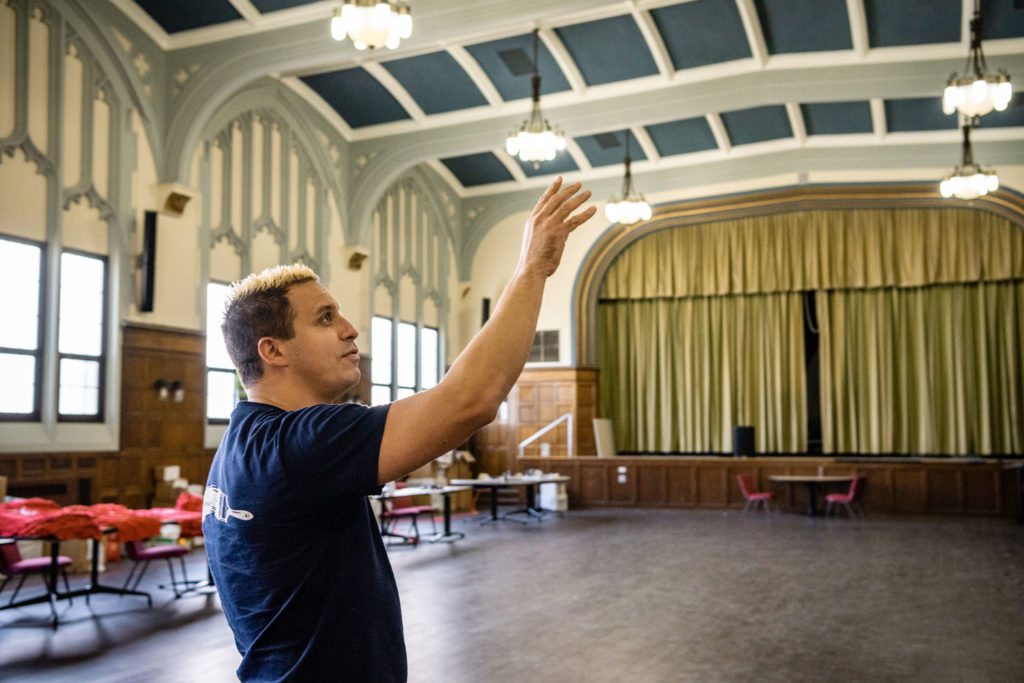
Chris Lambert. Photograph by Stephen Smith, courtesy of Bittersweet Monthly.
Dwan: I believe that we can live together, and I would love to see us do it in a way where we’re not just putting up with each other though. Because I think that’s the concern. If we’re not being honest and we’re not dealing with what’s really there, then you have a powder keg just waiting to go off.
People are living in situations and they’re not even aware of what their next-door neighbor is thinking. That’s the concern that I have. It’s a real honest conversation that I have with people often, because the way that Detroit has been developed is much like other cities. Lots of money and focus have been in the downtown and midtown area. If you go through on a Saturday or during the evening, those faces look a lot different than they did ten years ago in a city that’s 80 percent black. Now in the prime real estate where everything’s happening, you’ll go through there and you’ll see mostly white people. You’ll see the black people maybe working there.
In America right now to call someone a racist is almost like calling them a rapist. That is the tone that we have created around this word “racist.” Unfortunately, I think that just clouds the discussion that much more.
I tell people, we’ve done away with the blacks- and whites-only signs. But you can create a space that sends that same message to me, where I realize that you didn’t create this space with me in mind. I’m really not welcome here. You don’t need to put the signs up.
We have to have real honest, deep discussion on this. When you’re developing a space, and you make it this really beautiful, well-developed space where the people who are in the city don’t feel welcome or even just can’t afford to go, that’s not beautiful to me. As a black Detroiter, that is not beautiful at all.
We’ve done away with the blacks- and whites-only signs. But you can create a space that sends that same message to me, where I realize that you didn’t create this space with me in mind. I’m really not welcome here.
Now, we also have leftover devastation from the ’67 uprising, rebellion, riots, whatever you choose to call it. That’s not beautiful either. But one of them is more valuable to you. If I can roll to and fro as I like to in this place that looks desolate, underdeveloped, poverty-stricken, that’s of more value to me.
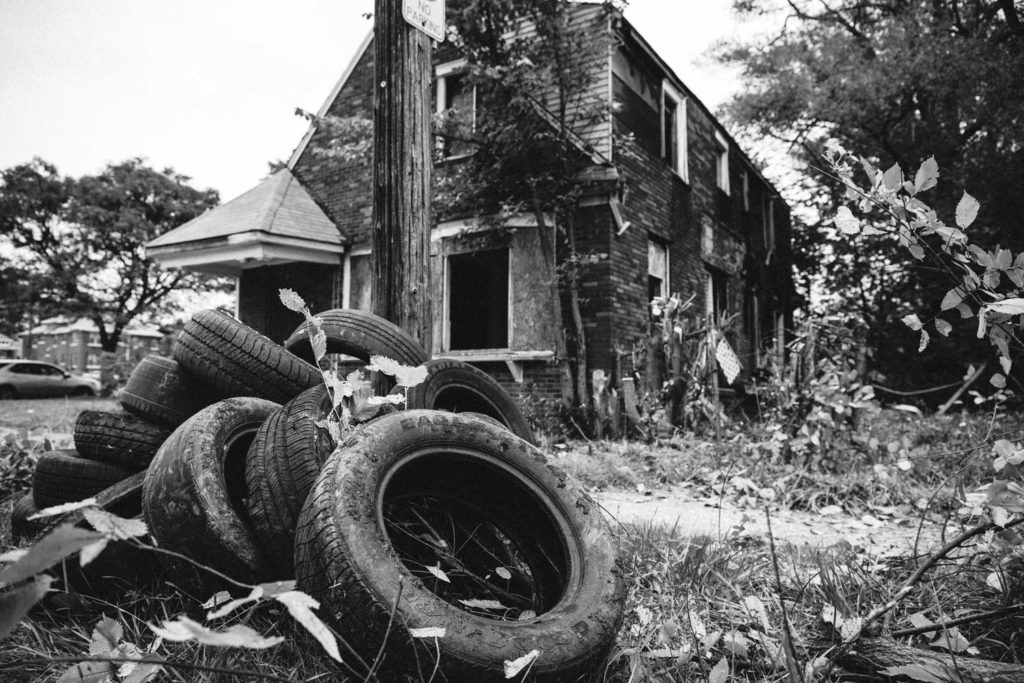
Another example of the advanced level of decay in many places in Detroit. Photograph by Stephen Smith, courtesy of Bittersweet Monthly.
Though black people may not collectively have the money it takes to renovate a full city . . . Black people do have enough money—and this is very controversial to say, but it’s the truth and we need to talk in a truthful way—we do have enough money to buy gasoline and burn a city down, and we’ve seen historically that if you push people too far, and you continue to violate people in different ways, they see that as the only option.
I don’t think that that’s being said in boardrooms enough. If we start to realize that and say that neither one of these spaces that we’re talking about is beautiful, but there is a place that’s in between—we have enough intelligent people to figure out how to create a space that’s inviting and welcoming to all and doesn’t feel like a takeover.
When you’re developing a space, and you make it this really beautiful, well-developed space where the people who are in the city don’t feel welcome or even just can’t afford to go, that’s not beautiful to me. As a black Detroiter, that is not beautiful at all.
Chris: Jesus says to whom much is given much is required. Because white people predominantly have more political power and financial power in the United States of America than black people do, it is on white people to create the environment where black people and white people want to live together.
Anne: One final question for you guys. This podcast, and the broader Breaking Ground project, has come from a sense that there’s a lot happening this year. Some people have used the phrase “This is a Kairos year,” or “Kairos moment,” which is that old Greek concept of something opening up, opportune, and it could either be really cleansing, as people look back historically on this moment, or really corroding.
Maybe there’s something in between that, given that we’re a fallen world and things are usually messier than just those two options. But with the broader national reckoning and what COVID-19 is revealing about long-standing vulnerabilities in the society, do you see any hope coming out of this? Both for the nation, and then more specifically as it affects Detroit? Do you see hope, and how would you define it? Or do you see some real potential dangers?
Chris: I’m not excited about the future of America as a nation. I’m very concerned about it. I don’t see political leadership likely to unite our country for a very long time. But I do have tremendous hope for what can happen at the local level in various parts of America.
I’m not excited about the future of America as a nation. I’m very concerned about it. I don’t see political leadership likely to unite our country for a very long time. But I do have tremendous hope for what can happen at the local level in various parts of America.
Look at Detroit. We have not seen the level of violence that so many other cities have seen because our police force has taken steps for several years to do such a phenomenal job with neighborhood policing to set a stage where Detroit was able to avoid that kind of violence. Now, could it still come back up at any time? Yes, at any point. But I’m concentrated. I’m hyper-local, and when I think about impact, I’m thinking about our region: Detroit, Metro Detroit, the city, the suburbs, and how we need to unite. Then I’m hoping that there are leaders all over this country who are going to do that on a local level where that’s going to then spill into the national scene. Really a bottom-up influence rather than a top-down.
Dwan: I’m interested to see what the suburban churches’ response is going to be. We are having conversations locally with some suburban churches. There are some folks who are really wanting to not leave this issue for the next generation to tackle. They’re getting some resistance. They’re getting some pushback, and we’re praying for them, and we’re trying to figure out how to come alongside them and support them in whatever way we can.
That is where I’m hopeful, but I’m hopeful in probably a relieved kind of way where I always make myself have hope. I also understand that we’re not able, but God is able, at the end of the day. It’s not too big for him, and he’s not less concerned about this than we are. But I think there is a really great opportunity for the church to push into repentance and also have a seat at the table.
The suburban church has lost its voice to speak as a leader, and that’s disorienting for the church—to enter into a space and have to sit at someone’s foot. But that’s where they have to start at, and I’m interested to see if they’re going to accept that position and that posture, and hopefully do some of the learning that Chris has described personally, that I’ve been experiencing personally and really represent our Messiah in a proud way.
The suburban church has lost its voice to speak as a leader, and that’s disorienting for the church—to enter into a space and have to sit at someone’s foot. But that’s where they have to start at, and I’m interested to see if they’re going to accept that position and that posture, and hopefully do some of the learning that Chris has described personally, that I’ve been experiencing personally and really represent our Messiah in a proud way.
We’ve had prophetic voices speak to us. Normally after the prophet speaks, as we resist, there’s hell to pay. We’ll see how we respond with prophetic voices.
Anne: Thank you to both of you. I really appreciate your time and your earned wisdom. Keep on keeping on. Thank you.
Dwan: Thank you.
Chris: Thank you.





